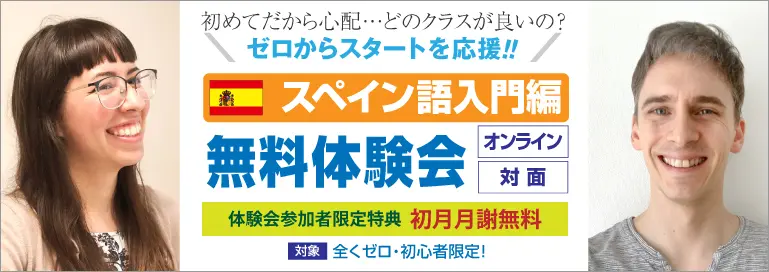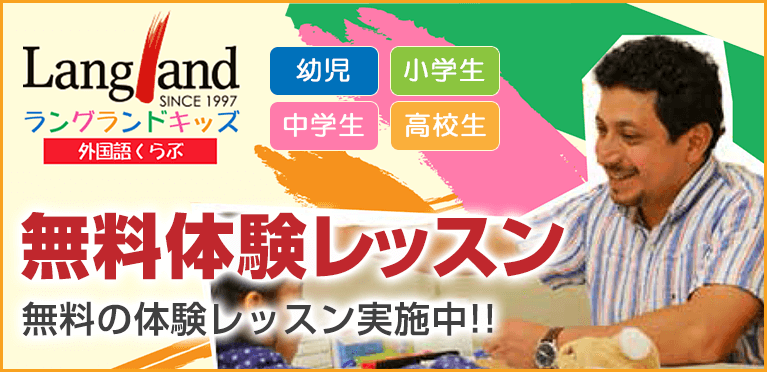WaiWaiブログ
聖ロレンゾの夜
2012/08/26
今月の文法は“essere”動詞の活用と使い方です!
イタリア語では動詞の活用形だけで人称がわかりますので人称代名詞を省略するのが普通です。
日本語で“~です”、“~ある”、“~いる”を意味する動詞をイタリア語では“essere動詞”と言います。:
・ io(私)sono
・ tu(君)sei
・ lui/lei/Lei(彼/彼女/あなた)e‘
・ noi(私たち)siamo
・ voi(君たち)siete
・ loro(彼ら/彼女たち)sono
例:
“Sono italiana.” (私はイタリア人です。)
“Yuri, di dove sei?”(ゆりさん、あなたはどこの出身ですか。)
“C` e` un buon ristorante qui vicino?”(この近くにいいレストランはありますか。)
“Siamo di Firenze.”(私たちはフィレンツェの出身です。)
“Dove siete adesso?”(君たちは今どこですか?)
“Le scale sono in fondo al corridoio.”(階段は廊下の突き当たりにあります。)
“essere動詞”+形容詞/副詞/副詞句は表現がたくさんあります:
1. essere felice/ essere triste (幸福である/ 悲しい)
2. essere buono/ essere cattivo (おいしい/ まずい)
3. essere libero/ essere occupato (暇である、空席である/ 忙しい、空席でない)
4. essere puntuale/ essere in ritardo (時間に正確である/ 遅れている)
5. essere gentile (親切である)
6. essere stanco (疲れている)
7. essere forunato/ essere sfortunato (運のいい人/ 運の悪い人)
8. essere possibile (可能である)
9. essere di molto valore (たいへん価値がある)
10. essere di cattivo umore (機嫌が悪い)
例:
“Questo gelato e` proprio buono.” (このアイスクリームはすごくおいしいです。)
“Grazie Maria, sei gentile.” (ありがとうマリアさん、優しいです。)
“Carlo e`sempre in ritardo!” (カルロさんはいつも遅れます!)
La notte di San Lorenzo (聖ロレンゾの夜)

今月8月10日聖ロレンゾと言う流れ星の夜について書きます。
Per alcuni giorni attorno al 10 agosto e` il periodo dell` anno in cui e` possibile vedere lo sciame meteorico delle Perseidi, che l` orbita terrestre attraversa durante l` estate.
Secondo la tradizione pero` questa notte e` dedicata al martirio di San Lorenzo (avvenuto proprio il 10 agosto): le stelle cadenti rappresentano infatti o le lacrime versate dal santo durante il suo supplizio, o i carboni ardenti su cui fu ucciso.
In questa notte si crede che si possano avverare i desideri di coloro che ricordano il dolore di questo santo, esprimendo una richiesta quando avvistano in cielo una stella cadente.
Come ogni anno, in Italia si organizzano tanti eventi per ammirare questo fenomeno celeste e in molte localita` la serata e`abbinata a feste con brindisi e degustazioni.
E voi avete espresso anche quest` anno i vostri desideri? (今年もお願いごとをしましたか?)




Al mese prossimo! (また来月に!)
エリーザ
A short history of Japanese Americans
2012/08/18
(This picture is of a Japanese language school in California around 1935.)
My great-grandfather went to America one hundred years ago. I don't know what kind of job he did. Maybe he worked on a farm or helped build the railroads in the American west. He started a family, saved his money and one day returned to his family home in Yamaguchi prefecture. His sons stayed in California. Then my father was born and then I became the fourth generation of my Japanese American family.
Japanese people living in America call themselves Nikkei. The first generation of immigrants came for work. They settled mostly in Hawaii, California and the American west coast. They worked on plantations or as farmers. Some were fishermen and some worked on the railroads. They spoke very little English and kept many of the traditions they grew up with in Japan. Many hoped that they would one day return to Japan. My great-grandfather returned, but many stayed.
The second generation is known as Nisei. They were born in America before World War II. They grew up as Americans but at home they spoke Japanese, ate rice with chopsticks and heard stories about life in the old country. My grandfather learned kendo, but baseball was also popular with many Nisei boys.
In 1941 the Japanese Navy attacked Pearl Harbor and war with Japan changed the lives of all the Nikkei. In California, Washington and Oregon all the people of Japanese ancestry were ordered to leave. Most of them had no place to go and were sent to camps set up in the mountains and deserts. This was a dark time for my family. My grandfather was Japanese but also American. Should he stay in a country that didn't want him or go to a country he barely knew?
After the war, my family had lost everything and had to start all over again. The Nikkei went back to west coast and rebuilt their homes, businesses and communities. They started new families and their children were called Sansei. Unlike the Nisei, the third generation grew up without learning much about their Japanese roots. They used forks instead of chopsticks and they spoke only a few words of Japanese that they heard from ojichan like "baka" and "chotto matte." The Sansei looked Japanese but struggled with trying to prove that they were Americans.
I am fourth generation Japanese American. Both my father and mother are Japanese, but many people ask me if I am half. Today, it is common for Nikkei to marry with a non-Japanese person. While the fourth and fifth generations are becoming less Japanese in appearance, we have many chances to learn about Japan. Japanese restaurants are very popular in America, many communities have Japanese culture festivals, kids watch anime and Japanese television shows on the Internet and it is easy to travel to Japan. In the next blog I will write about Nikkei culture. Thanks for reading!
Questions:
What is Nikkei?
Where did most Japanese live in America?
What happened to Nikkei during World War II?
ロンドン五輪サッカー
2012/08/08
連日のオリンピック観戦で皆さん体長崩されたりなどされてませんか!?
今回は、団体競技で日本の団結力を発揮している大会だと感じますが、
これを書いてる現在、注目度の高い男女サッカーが、
男子は残念ながら準決勝で敗れ、次は3位決定戦での日韓戦、
女子は2年前のW杯決勝に続く、アメリカ戦という、映画のシナリオのような日程です。
特に男子は、大方の予想を覆す大躍進で、
永井選手はじめ、ヨーロッパのスカウト陣からも注目を浴びる存在となりましたね。
次の相手は韓国、あちらは「兵役免除」を懸けての、まさに死闘が予想されます。
なでしこの金メダル同様、観る側もまだまだ予断が許せませんね・・・(笑)。
個人的には、扇原選手が準決勝後にミスを悔やんで肩を落としていましたが、
この経験を糧に、今後更に大きくなってくれることを楽しみにしてます。
展開力があり、とてもスマートな選手で、早くに海外挑戦してもらいたい逸材。
彼のキャリアでのひとつの分岐点となるよう、今後注目の選手です。
スタッフS.S
Les verbes irreguliers « –re »
2012/08/02
Bonjour a tous!
C’est l’ete, a Tokyo il fait vraiment chaud et humide !
Voyons aujourd’hui quelques verbes en « –r e »
主語のJeで例文を見てみましょう。
Boire ボアール (飲む)
Je bois du cafe tous les matins..
私は毎朝コーヒーを飲みます。
Faire フェール (する)
Je fais du tennis le dimanche
私は日曜日にテニスをします。
Lire リール (読む)
Je lis un roman dans le train.
私は電車で小説を読みます。

Ecrire エクリール (書く)
J’ecris une lettre d’amour.
私はラブレターを書きます。
Dire ディール (言う)
Je dis bonjour a la voisine.
私は隣の人に挨拶をします。
re動詞は不規則動詞です。
主語のJeで活用すると語尾「-re」が「-s」に変わります。
Boire ボアール > Je bois ジュ ボア
Faire フェール > Je fais ジュ フェ
Lire リール > Je lis ジュ リ
主語のVousで例文を見てみましょう。
Vous buvez du vin?
あなたはワインを飲みますか?
Vous faites du sport?
あなたはスポーツをしますか?
Vous lisez le journal?.
あなたは新聞を読みますか?
Vous ecrivez des emails?
あなたはメールを書きますか?
Vous dites merci a la vendeuse ?
あなたは店員さんにありがとうと言いますか?
主語のVousで活用するとスペルが変わりますので、気をつけましょう!
Vous buvez ヴ ブヴェ
Vous faites ヴ フェット
Vous lisez ヴ リーゼ
Vous ecrivez ヴ ゼクリーヴェ
Vous dites ヴ ディット
———————————————————————————————————————————
Nous sommes en aout, les vacances d’ete pour presque tous les francais !
Beaucoup prennent 3 semaines de vacances a la mer ou a la montagne.
En general, les francais preferent passer leurs vacances en France.
Certains font du camping, avec un tente, une caravane ou un camping-car. C’est tres populaire !
Bonnes vacances pour ceux qui en ont et a la prochaine !
Fabien
フェルメール
2012/07/31
オリンピックが始まり、寝不足の方も多いかと思いますが、
皆さん、くれぐれも体調管理にはお気をつけ下さい。
この暑さ、寝不足は致命傷ですので・・・。
さて、上野で開催中の「マウリッツハイス美術館展」には足を運ばれましたでしょうか?
目玉は、ご存知、フェルメールの「真珠の首飾りの少女」ですが、
私は、早々に前売りを買ったものの、いつが空いているかな・・・などと考えながら、
いまだに行けず、今に至っていますが、フェルメール好きの方には是非お薦めしたいのが、
銀座で開催中の「フェルメール 光の王国展」。
分子生物学者の福岡伸一先生が監修された、彼のフェルメールオタクっぷりが存分に発揮された展示会です。
リ・クリエート作品なので、もちろん本物ではありませんが、
フェルメールの全作品を鑑賞できてしまう展示で、
ファンならずとも、勉強するにはもってこいの内容ですので、上野の予習に是非どうぞ。
※8/26まで会期延長になったそうです!
作品数が少ない画家だけに、それぞれの作品に対する想いも強くなり、
自分なりの解釈、いろいろな想像ができる絶好の機会です。
個人的には、フェルメールの生まれ育ったデルフトに行ってみたいという気持ちが強くなりました。
いつか「デルフトの眺望」(↓)と同じ景色を朝7:10に眺めてみたいです。
スタッフS.S
新着情報
-
クリスマスの歌
2019/12/12 -
“英語&フランス語で話そう!!”報告♪
2019/12/12 -
Langland Christmas Party 2014 の様子をお届けします♪
2014/12/09 -
TOEIC SW IPテスト 9月からスタートしました!
2014/09/22 -
DELE B1検定対策コース:渋谷校で9/16(火)よりスタート!
2014/09/16
バックナンバー























